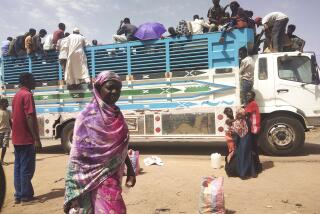IMF Panel Approves Gulf Aid : Iraqi invasion: The agency endorsed the effort to supply billions of dollars to nations hurt by the crisis.
- Share via
WASHINGTON — The International Monetary Fund gave approval today to an accelerated effort to supply billions of dollars to help countries hurt by the Persian Gulf crisis.
The approval by the IMF’s policy-making interim committee represented a victory for the Bush Administration, which is counting on both the IMF and its sister lending agency, the World Bank, to help in the international effort to isolate Iraqi President Saddam Hussein.
In a final communique, the IMF interim committee directed the staff of the international lending agency to “respond on an expedited basis to present difficulties.”
The communique provided no specifics on how much money would be forthcoming, but U.S. officials have discussed that three countries alone--Egypt, Jordan and Turkey--would need between $13 billion and $16 billion in economic assistance through the end of next year.
Canadian Finance Minister Michael Wilson said the lack of specifics did not indicate dissension on the part of the 22 finance ministers on the interim committee, but rather a desire to leave as much flexibility as possible for the IMF to channel aid to countries.
“We recognized the urgency of the needs of the people who are affected,” Wilson said. “The urgency is stated, the framework is provided and now it is up to the IMF management to respond.”
The IMF approval for increased assistance followed comments by World Bank President Barber Conable that his institution also stood ready to provide assistance.
Echoing the remarks by Conable, IMF Managing Director Michel Camdessus told reporters today that he believed the increased aid could start in the early months of 1991.
In addition to assistance for the so-called front line states of Egypt, Jordan and Turkey, the United States is also seeking billions of dollars in additional contributions to a host of countries to offset the adverse effects of higher oil prices.
Nations mentioned for this group include the emerging democracies of Eastern Europe as well as such Third World countries as the Philippines, India and Brazil.
More to Read
Sign up for Essential California
The most important California stories and recommendations in your inbox every morning.
You may occasionally receive promotional content from the Los Angeles Times.













